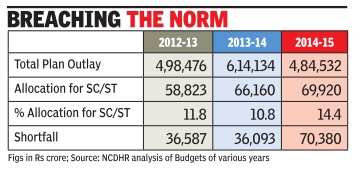Scheduled Caste and tribal sub-plan: India

This is a collection of articles archived for the excellence of their content. |
Underutilisation of outlay: 2012-15
Feb 26 2015
Subodh Varma
Govt doesn't allocate mandated plan outlays for dalits, adivasis
All governments till now, including the present one, have promised that they will do their utmost to uplift dalits and adivasis who make up about 24% of India's population and generally occupy the lowest rung of the social and economic hierarchy . One way of fulfilling this eternal promise has been the system of specially earmarking funds from the Five Year Plan outlays for dalits and adivasis. It is legally mandated that every ministry and department should earmark 16% funds for schedule castes and 8% for schedule tribes, making up 24% of the total Plan outlay. This earmarking policy is called the Scheduled Castes Sub Plan (SCSP) and the Tribal Sub Plan (TSP).
Here is what is actually happening: in the current year, only about 14% funds were earmarked in this manner. In the previous two years, it was about 11%. In fact, in the whole of the 11th Plan it was about 10-12%.
How much does this short fall work out to? Just for the cur rent year, about Rs 70,000 crore were not allocated although ministries were required to do so. Each year, a similar amount of money is diverted away from dalits and adivasis. In the last eight years, dalits have been deprived of Rs 1,98,539.1 crore while adivasis have lost Rs 84,916.4 crore, according to an analysis done by the National Campaign on Dalit Human Rights (NCDHR), a Delhi-based advocacy group.
“What is going on is absolutely illegal. It is mandatory for government bodies to earmark funds but they continue to evade this,“ rues Paul Diwakar of the NCDHR.
But the story doesn't end here. Even the truncated amounts allocated are never ful ly spent, Diwakar explains.
In 2011-12, Rs 2,899 crore out of allocated funds for dalits remained unspent. Similarly , Rs 1,013 crore of funds meant for adivasis were unspent. In 201213, Rs 3,592 crore of SCSP funds and Rs 1,526 crore of TSP funds were not spent according to NCDHR comparison of budget estimates with actual spending, which is revealed only two years later. “These unspent amounts are huge, running into thousands of crores of rupees.They could have made all the difference in lives of thousands of families,“ said Diwakar.
NCDHR has gone a step further and analyzed what the funds are allocated for -and the results are disturbing.
Only about a third of the funds allocated for dalits and adivasis are targeted, that is, they go only for these communities. The remaining two thirds are non-targeted and notional allocations that NCDHR calls `retro-budgeting' -you spend the money on some scheme that covers the whole population and then claim that it must have benefited dalits and adivasis too. In the 2014-15 Budget, targeted allocation went down to just 21% for dalits and 27% for adivasis.
Another problem identified by NCDHR is the nature of schemes or measures for which these earmarked funds are spent. Over 68% of the funds allocated for dalits and 77% for adivasis are spent on schemes that ensure `survival' and not development or participation.Examples of what NCDHR classifies as `survival' ensuring schemes are food, hostels, scholarships etc. as opposed to skill development for modern jobs, which would be empowering.
“Only willful negligence and resistance to bridge the gap can explain this sad situation, after 67 years of independence and progress,“ said Diwakar.
